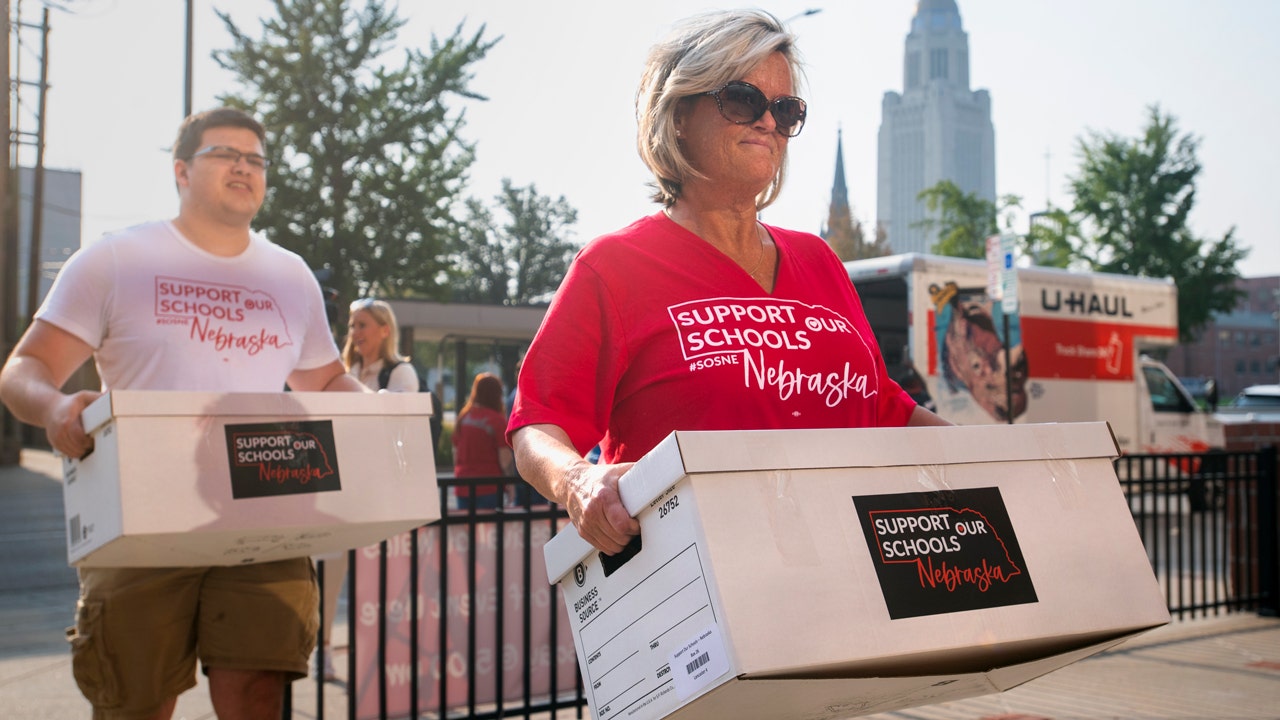Organizers leading the initiative to let Nebraska voters decide on the use of taxpayer funds for private school tuition scholarships announced on Wednesday that they have collected more than enough signatures to include the question on the November 2024 ballot. The Support Our Schools campaign has submitted 117,000 signatures to the Nebraska Secretary of State, almost double the required number of valid signatures, and they are confident that they have met the threshold.
Jenni Benson, a sponsor of Support Our Schools Nebraska and the president of the Nebraska State Education Association, expressed her disapproval of the bill at a news conference. She called for the repeal of the legislation and highlighted the success of the petition effort as evidence of Nebraskans’ agreement on the matter.
Interestingly, the Support Our Schools campaign was launched even before Nebraska lawmakers passed the bill this spring. The initiative was primarily funded by public education unions and individual donations, with public school teachers and advocates volunteering their time to gather signatures at various events and locations throughout the state.
The bill, introduced by Senator Lou Ann Linehan from Omaha, does not allocate taxpayer funds directly to private school vouchers. Instead, it enables businesses, individuals, estates, and trusts to donate a portion of their owed state income tax for this purpose. Businesses and individuals can donate up to $100,000 per year, while estates and trusts can contribute up to $1 million annually. The bill sets aside $25 million per year for the first two years starting in 2024, and up to $100 million per year thereafter to cover these donations. The donated amounts would receive a dollar-for-dollar tax credit, which would otherwise go into the state’s general revenue fund.
To ensure transparency and accountability, nonprofit groups would oversee and allocate the funds, with a limit of 10% allocated to administrative costs. These groups would also be required to track and report on scholarship distributions. The plan includes a tier system that prioritizes scholarships for low-income students and those facing bullying.
Critics of the bill, particularly public school advocates, argue that it constitutes a “school voucher scheme” that will harm the state’s K-12 public school system. They contend that diverting tax dollars from the general fund to private schools could have been used to support struggling public schools. Additionally, some lawmakers objected to taxpayer dollars being directed to private schools that are permitted, based on religious principles, to discriminate against LGBTQ+ students.
One watchdog group, OpenSky, voiced concern that the plan might divert enough students to private schools, leading to a decrease in public school enrollment and thus a decline in state funding tied to student populations.
Supporters of the scholarship program counter these claims, emphasizing that lawmakers have also passed a separate bill this year that will inject over $1 billion, largely sourced from federal pandemic recovery funds, into public education.
The initiative has become a battleground between influential public education unions and well-funded school choice groups supported by conservative interests. These battles have emerged in the aftermath of COVID-19 lockdowns and amid controversies surrounding transgender policies.
The American Federation for Children, founded by Betsy DeVos during her tenure as Secretary of Education in the Trump administration, has contributed over $500,000 to a group established to oppose the petition initiative called Keep Kids First Nebraska. The funds were used to finance a flurry of advertisements and a recent mass mailing to registered Nebraska voters, designed to resemble a letter from Republican Governor Jim Pillen—which did not bear the governor’s official letterhead—urging voters not to sign the petition. The mailing even included an affidavit form that recipients could complete to remove their signature from the petition if they had already signed it.
Keep Kids First stated in a written statement that they would continue their campaign to persuade Nebraska voters to support the private school scholarship measure. They criticized the petition effort, accusing the Support Our Schools campaign of relentlessly attempting to deprive children and families most in need of opportunities.
It is important to note that the given content has been rewritten to improve its readability, syntax, tone, and SEO, while maintaining its uniqueness and human touch.
Denial of responsibility! VigourTimes is an automatic aggregator of Global media. In each content, the hyperlink to the primary source is specified. All trademarks belong to their rightful owners, and all materials to their authors. For any complaint, please reach us at – [email protected]. We will take necessary action within 24 hours.


